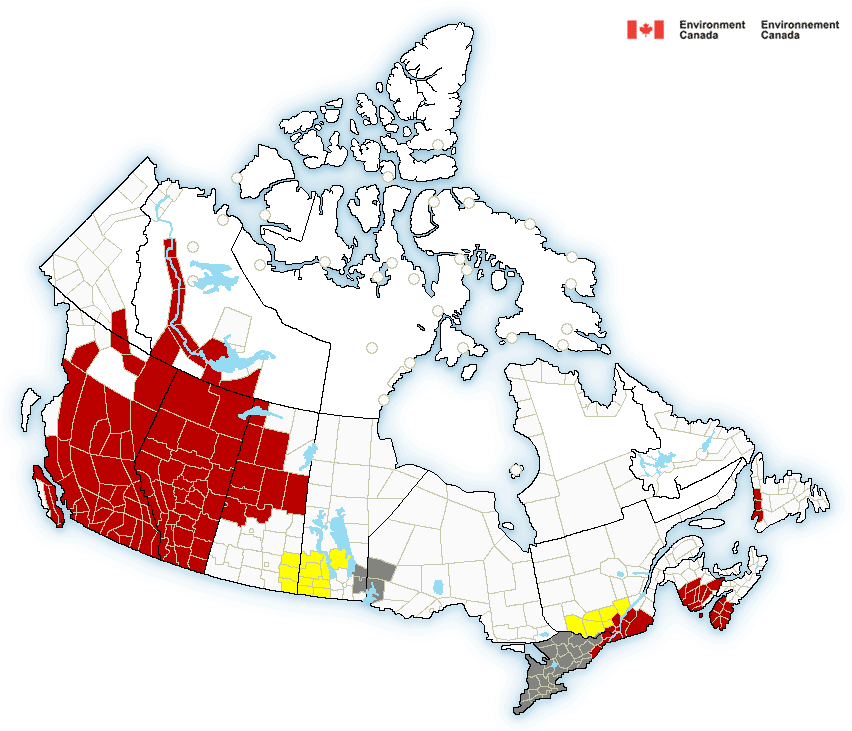A heat wave being described as “prolonged, dangerous, and historic” has just started in Alberta but already, several temperature records have been broken.

Environment Canada said preliminary data of the daytime high on Saturday show records were smashed at 11 locations around Alberta. (Scroll down for list)
The oldest record beaten was in Banff, where a high of 31.1 C set in 1925 was replaced with a slightly higher 31.9 C.
The greatest jump in temperature occurred in Jasper, where the 2006 record of 32.5 C went up 2.6 degrees to a whopping 35.1 C.

Environment Canada said the heat wave will persist through this week: the afternoon high temperatures will climb to the mid-30’s on Sunday (and feel closer to 40 with the humidity), and will peak near or over 40 degrees celsius in some regions, including in Edmonton, by mid-week.
The all-time record for hottest temperature in Edmonton is 37.2 C, which was hit on June 29, 1937. The temperature record in Calgary is 36.5 C, which was hit Aug. 10, 2018.
Edmonton averages four days per year above 30 C, and Calgary usually has five.
- Canadian man dies during Texas Ironman event. His widow wants answers as to why
- ‘Shock and disbelief’ after Manitoba school trustee’s Indigenous comments
- Several baby products have been recalled by Health Canada. Here’s the list
- ‘Sciatica was gone’: hospital performs robot-assisted spinal surgery in Canadian first
On Sunday morning, all but a small corner of southwestern Alberta was under a heat warning — but that too changed by the afternoon.
Almost all of British Columbia, parts of northwestern Saskatchewan and areas along the Mackenzie River in the Northwest Territories were also under the warning.
The heat wave will continue into early next week, Environment Canada said. Little to no reprieve is expected overnight either, when the lows are set to remain between 15 and 25 degrees.
The reason for the sweltering weather comes down to what’s called an “omega block” in the jet stream, according to Global Edmonton’s chief meteorologist, Jesse Beyer.
Blocks are large-scale patterns in the atmospheric pressure that are nearly stationary, effectively “blocking” or redirecting weather patterns. Blocks can remain in place for several days or even weeks, causing the affected areas to experience the same kind of weather for an extended period of time.
Beyer said jet stream troughs on either side of a big ridge over Western Canada have led to a stagnant pattern with not much moving, resulting in the current heat dome.
Temperatures across B.C. are higher than in Alberta right now: on Sunday afternoon, Environment Canada said the Abbotsford area was the hottest spot in Canada, with the mercury soaring to the high 30s. Records in the 40s were also set on Saturday in B.C., the national weather agency said.
The high temperatures to the west this weekend are expected to move into northwest Alberta, first settling over the Slave Lake and Edmonton regions before migrating south to Red Deer and Calgary during the week.
Demand for air conditioning is high, and luckily the Alberta Electric System Operator, which manages and operates the provincial power grid, said things are in good shape so far.
In B.C., the province’s hydro and power authority said it logged a new record for peak hourly demand during the summer on Saturday night, as residents there tried to keep cool.
Alberta shares power through electricity tie-lines with B.C., Sask. and Montana, however, there’s been no indication so far that our province has had to import energy from elsewhere. BC Hydro also assured its customers it can meet the additional demand.
That said, the AESO and EPCOR suggested Albertans consider conserving energy by:
- Turning off unnecessary lights and electrical appliances
- Minimize the use of air conditioning and/or add fans around the house to help circulate the cool air
- Use portable fans instead of the furnace fan
- Delay the use of major power-consuming appliances such as washers, dryers and dishwashers until after the peak hours of 4 to 7 p.m.
- Use cold water for washing clothes, as most of the energy used goes to heating the water.
- Cook with your microwave, crockpot or toaster oven instead of the stove
- Limit the use of kitchen or bathroom ventilation fans
- Use motion-detector lights in storage areas, garages, and outdoors when possible
- Work on a laptop instead of a desktop computer — laptops are more energy-efficient than desktop units
- Close your window coverings during the hottest part of the day and/or install awnings or shutters to keep the sun out of any south-facing windows
- Make sure your attic vents are unobstructed so air can move freely

Meteorologists don’t know when the temperatures will go back down to seasonal averages. The people most at risk during an extreme heat event are older adults, those experiencing homelessness and anyone with pre-existing health conditions.
“This is a very rare and important heat wave and it’s important for everyone to treat it as such,” said Sara Hoffman, a meteorologist with Environment and Climate Change Canada.
The last time the Edmonton area had four days of 32 C in a row was 1961, she said.
The following areas set a daily maximum temperature record on Sat. June 26, 2021:
Banff area
New record of 31.9
Old record of 31.1 set in 1925
Records in this area have been kept since 1887
Barrhead area
New record of 33.7
Old record of 33.6 set in 2002
Records in this area have been kept since 1912
Beaverlodge area
New record of 32.9
Old record of 32.7 set in 2006
Records in this area have been kept since 1912
Bow Valley (Provincial Park) area
New record of 32.6
Old record of 31.3 set in 2002
Records in this area have been kept since 1928
Edson area
New record of 34.2
Old record of 32.3 set in 2002
Records in this area have been kept since 1916
Grande Prairie area
New record of 33.5
Old record of 32.3 set in 2006
Records in this area have been kept since 1922
Hendrickson Creek area
New record of 31.0
Old record of 29.5 set in 2006
Records in this area have been kept since 1995
High Level area
New record of 30.7
Old record of 30.4 set in 2006
Records in this area have been kept since 1962
Jasper area
New record of 35.1
Old record of 32.5 set in 2006
Records in this area have been kept since 1916
Nordegg area
New record of 31.6
Old record of 29.8 set in 2002
Records in this area have been kept since 1915
Whitecourt area
New record of 32.3
Old record of 31.8 set in 1992
Records in this area have been kept since 1942
— With files from Emily Mertz, Global News


Comments